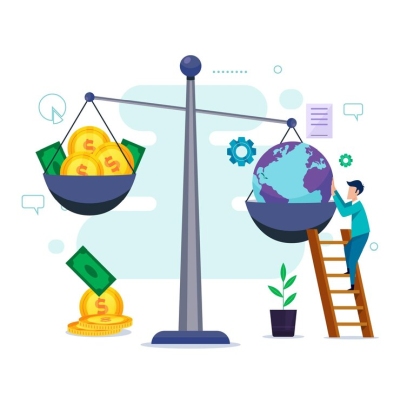Climate Inflation | Feb 6, 2024
In a recent podcast, Anna Dean and Stephen Jacobi feature the pressing issue of Climate Inflation and key takeaways
The podcast highlighted a critical warning from economist Paul Conway, Chief Economist at the Reserve Bank of New Zealand, about the emerging challenge of climate inflation.
He stated that climate change is in part responsible for recent inflation and the cost of living crisis – the rising cost of food, spiralling insurance premiums, the escalating cost of construction (as a result of additional demand created in cyclone/flood-damaged areas) pose a threat to economic stability and personal finance.
The insights shared in the podcast underscore the urgency of integrating climate considerations into financial planning and investment strategies, emphasizing the need for the financial sector to adapt to and mitigate the effects of climate change.
See: Harnessing Decentralized Finance to Combat Climate Change: A New Era of Sustainable Finance
The mention of rising home insurance bills due to climate change highlights the broader implications for the insurance industry and financial markets. As risks increase, there could be significant shifts in how risks are assessed and priced, affecting homeowners, businesses, and insurers.
Policy Implications
The realization that climate change is affecting people’s financial well-being could catalyze political action. Historically, the lack of immediate economic impact has made it challenging to mobilize political will and public support for significant climate policies. However, as the economic consequences become more apparent, there may be increased pressure on governments to take decisive action on climate change, potentially leading to more aggressive environmental policies and investments in sustainable infrastructure.
Climate Inflation Discussion
The discussion suggests a growing awareness among the public and businesses about the tangible effects of climate change on their daily lives and financial health. This awareness could lead to changes in consumer behavior, such as increased demand for sustainable products and services, as well as changes in business practices towards more sustainable operations.
See: Biden’s Clean Energy Plan vs. Banking Regulations
The presence of climate change skeptics and deniers in the discussion, as well as references to “climate scams,” indicates ongoing challenges in achieving consensus on climate action. Overcoming misinformation and skepticism remains a significant hurdle for mobilizing collective action on climate change.
Comments
Kevin Brady criticizes the reliance on economists for leadership on climate change, arguing that they lack understanding of what is crucial for ecosystem resilience and human survival. This comment is insightful because it suggests a broader, more holistic view of addressing climate change, emphasizing the importance of integrating ecological sustainability into economic decision-making.
Iain Climie discusses the immense benefits of reducing food waste, citing the IMECHE’s “Waste Not Want Not” report, which notes that at least 30% of global food production is wasted. This comment is insightful because it implicitly critiques the inefficiency of current food systems and suggests a potential area for impactful change.
See: Canadian Banks Face Scrutiny Over Sustainability Claims
Colin Grant argues that the last hope for addressing climate change lies in massive-scale ecosystem regeneration, a solution that is not prioritized by most governments. This comment is insightful because it goes beyond merely reducing emissions and emphasizes the importance of restoring natural habitats and biodiversity as a way to sequester carbon, regulate climate, and support life on Earth.
Nathan Simmonds questions how long it will be until the systems supporting human civilization collapse under their own weight, critiquing the encouragement of over-consumption and pollution by businesses and institutions. This comment is insightful because it highlights the unsustainable nature of current consumption patterns and the blame placed on individuals for systemic issues.
Conclusion
As we live the adverse affects of climate inflation, let’s commit to fostering sustainable economic growth through education, innovation, and collaboration. By doing so, we can ensure a resilient financial future that benefits all Canadians and sets a global standard for sustainability in finance.

 The National Crowdfunding & Fintech Association (NCFA Canada) is a financial innovation ecosystem that provides education, market intelligence, industry stewardship, networking and funding opportunities and services to thousands of community members and works closely with industry, government, partners and affiliates to create a vibrant and innovative fintech and funding industry in Canada. Decentralized and distributed, NCFA is engaged with global stakeholders and helps incubate projects and investment in fintech, alternative finance, crowdfunding, peer-to-peer finance, payments, digital assets and tokens, artificial intelligence, blockchain, cryptocurrency, regtech, and insurtech sectors. Join Canada’s Fintech & Funding Community today FREE! Or become a contributing member and get perks. For more information, please visit: www.ncfacanada.org
The National Crowdfunding & Fintech Association (NCFA Canada) is a financial innovation ecosystem that provides education, market intelligence, industry stewardship, networking and funding opportunities and services to thousands of community members and works closely with industry, government, partners and affiliates to create a vibrant and innovative fintech and funding industry in Canada. Decentralized and distributed, NCFA is engaged with global stakeholders and helps incubate projects and investment in fintech, alternative finance, crowdfunding, peer-to-peer finance, payments, digital assets and tokens, artificial intelligence, blockchain, cryptocurrency, regtech, and insurtech sectors. Join Canada’s Fintech & Funding Community today FREE! Or become a contributing member and get perks. For more information, please visit: www.ncfacanada.org
Related Posts
- SEO Powered Content & PR Distribution. Get Amplified Today.
- PlatoData.Network Vertical Generative Ai. Empower Yourself. Access Here.
- PlatoAiStream. Web3 Intelligence. Knowledge Amplified. Access Here.
- PlatoESG. Carbon, CleanTech, Energy, Environment, Solar, Waste Management. Access Here.
- PlatoHealth. Biotech and Clinical Trials Intelligence. Access Here.
- Source: https://ncfacanada.org/climate-inflation-discussion-for-a-sustainable-future/




